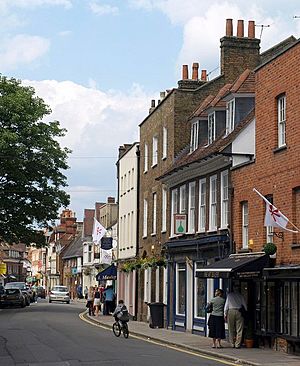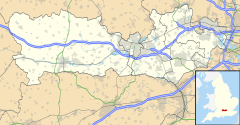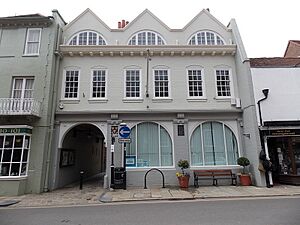Eton, Berkshire facts for kids
Quick facts for kids Eton |
|
|---|---|
 Eton High Street |
|
| Population | 4,692 (2011 Census) |
| OS grid reference | SU965775 |
| Civil parish |
|
| Unitary authority |
|
| Ceremonial county | |
| Region | |
| Country | England |
| Sovereign state | United Kingdom |
| Post town | WINDSOR |
| Postcode district | SL4 |
| Dialling code | 01753 |
| Police | Thames Valley |
| Fire | Royal Berkshire |
| Ambulance | South Central |
| EU Parliament | South East England |
| UK Parliament |
|
Eton (/ˈiːtən/ EE-tən) is a small town in Berkshire, England. It sits right across the River Thames from Windsor. A famous bridge, Windsor Bridge, connects the two towns. In 2011, about 4,692 people lived in Eton.
Eton is best known as the home of Eton College, a very old and famous school. You can also walk or cycle through Eton on the Thames Path, which is a long trail along the River Thames.
The town is also home to Swan Lifeline. This is the oldest charity dedicated to helping sick and injured swans in the Thames Valley area. Famous people like George Michael and Michael Parkinson have supported it.
Contents
Eton's History
The land where Eton now stands once belonged to Queen Edith, who was the wife of King Edward the Confessor. After the Normans took over England in 1066, they took control of this land. A small village grew up here because the main road between Windsor and London passed through. People lived here to help maintain the road and the bridge.
Building Eton College
In 1440, King Henry VI chose Eton as the perfect spot for his new school, Eton College. Many workers moved to Eton to help build the college. The land around the village was given to the college, which meant the town couldn't grow much more.
The new college chapel became a popular place for people to visit, like a pilgrimage site. This led to inns and guesthouses opening along the high street. King Henry VI even gave the college the right to hold fairs on its grounds.
Eton During the English Civil War
During the English Civil War (a big fight in England in the 1600s), Windsor Castle was captured by the Parliament's army. The King's army then moved into Eton. They tried to take Windsor Castle back, even occupying Eton College. However, their efforts failed, and the King's soldiers eventually left.
Modern Changes in Eton
Over time, the college sometimes rented small pieces of land to the village. This helped more houses get built near the bridge. In the past, students from Eton College used to collect money, called "salt," from the inns on Eton High Street. This tradition ended in 1845 when a student felt it was a bad influence on the students.
Eton was one of the first villages in the UK to get modern updates. It had its own post office and a modern drainage system. By 1925, Eton was seen as more of a business town than a place where many people lived. Most buildings, apart from the school itself, were businesses serving the students. Around 1970, the bridge connecting Eton to Windsor was closed to cars, becoming only for walkers and cyclists.
Famous People from Eton
Here are some notable people who were born in or lived near Eton:
- William Oughtred (1574–1660), a mathematician and church leader.
- Edmund Bristow (1787–1876), an artist who lived his whole life in the Windsor area.
- Charles Duke Yonge (1812–1891), an English historian and cricket player.
- George E. Davis (1850–1906), known as one of the founders of chemical engineering.
How Eton is Governed
Eton has two main levels of local government:
- Eton Town Council: This is the local council for the town. It has seven councillors representing Eton and seven more representing Eton Wick.
- Windsor and Maidenhead Borough Council: This is the larger council for the whole area. Eton is part of the "Eton and Castle" area within this council.
At the national level, Eton is part of the Windsor area for the UK Parliament. Currently, Jack Rankin from the Conservative Party represents this area.
Getting Around Eton
Bus Services
Two bus companies serve Eton:
- Thames Valley Buses runs buses from Monday to Saturday on the Slough – Eton – Eton Wick – Taplow – Maidenhead route (bus 15).
- Redline Buses operates the Slough – Eton – Eton Wick – Dorney – Maidenhead route on Tuesdays and Fridays (bus 63/68).
Train Stations Near Eton
Windsor, just across the bridge from Eton, has two train stations:
- Windsor & Eton Riverside: This station is very close to Windsor Bridge. You can catch South Western Railway trains here to London Waterloo.
- Windsor & Eton Central: This station is a bit further uphill. Great Western Railway trains from here go to Slough. From Slough, you can connect to other trains, including those to London Paddington.
Nearby Towns
- Windsor (0.5 miles away, connected by Windsor Bridge)
- Slough (2 miles away)
- Staines-upon-Thames (7 miles away)
- Maidenhead (7 miles away)
- Reading (21 miles away)
- London (21 miles away)
See also
 In Spanish: Eton (Berkshire) para niños
In Spanish: Eton (Berkshire) para niños



